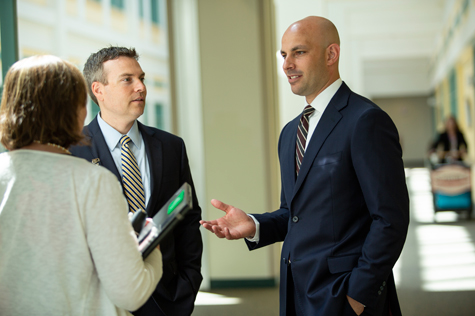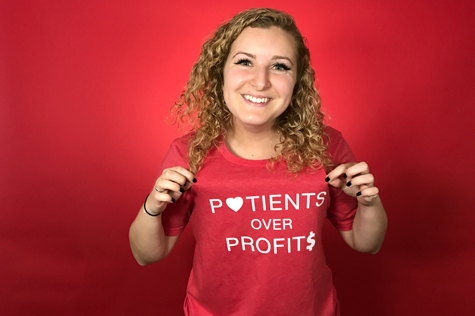Addiction, HIV Testing, High Drug Prices, and Cancer Screening: Impact of MPH Internships Extends from Hanover to Kosovo
Sky-high prescription drug costs mean some people in the U.S. have to choose between paying the heating bill or getting the medicine they need. At the same time, the opioid epidemic is paralyzing communities across the country. Healthcare challenges, however, are hardly confined to the U.S. Systems are overburdened and services fragmented in many countries. Field internships in Dartmouth's on-campus MPH program are designed to give students the opportunity to apply the academic principles and skills they’ve learned to address these challenges while working toward achieving their healthcare career goals. Read how four recent graduates have worked to effect meaningful improvements in care from rural Vermont to the small nation of Kosovo, Europe’s newest country.
Brent Quimby
Internship Site: Dartmouth-Hitchcock Medical Center, Lebanon, NH
Career Interests: Healthcare consulting; MBA student, Tuck School of Business, Fall 2018 With plans to start Tuck’s MBA program next year, Brent Quimby wanted to set up an internship focused on the business side of public health. Dartmouth Institute faculty connected him with a newly formed project at Dartmouth-Hitchcock to evaluate the feasibility of building a center for addiction medicine. His work included conducting a strategic and cost analysis.
With plans to start Tuck’s MBA program next year, Brent Quimby wanted to set up an internship focused on the business side of public health. Dartmouth Institute faculty connected him with a newly formed project at Dartmouth-Hitchcock to evaluate the feasibility of building a center for addiction medicine. His work included conducting a strategic and cost analysis.
New Hampshire is near the bottom when it comes the number of treatment programs available to people seeking help for substance abuse disorder, so implementing a center for addiction medicine would be a critical first step to improving care, Quimby says.
“When we started the MPH program in Fall 2017, our president said New Hampshire was a ‘drug-infested den,’” Quimby says. “There is some legitimacy to those claims when you look at the statistics; however, this is a rural area where access to treatment for substance abuse disorder is somewhat limited. Establishing a center that could provide a coordinated and integrated effort of care for people struggling with addiction, or even just pointing them in the right direction for services they need, is essential. We’re working to determine the ideal functions that the center can fulfill for the community.”
Given Dartmouth-Hitchcock’s prominence as New Hampshire’s only academic medical center, most people in this area would look to Dartmouth-Hitchcock first for help struggling with addiction, Quimby says.
“I think that’s a win for this area. I think it would eventually turn into a win for this state and get (New Hampshire) off the national radar (when it comes to substance abuse and lack of available treatment).”
Niki Cozzolino
Internship site: Lown Institute, Brookline, MA
Career Interests: Patient advocacy, aspiring physician
 At rallies in Boston and Washington, D.C., protesting the high price of insulin, Niki Cozzolino was inspired to march alongside healthcare professionals who were “fed up with today’s healthcare system.”
At rallies in Boston and Washington, D.C., protesting the high price of insulin, Niki Cozzolino was inspired to march alongside healthcare professionals who were “fed up with today’s healthcare system.”
“It’s a 100-year-old drug that people can’t afford anymore. We made poster-sized Mother’s Day cards addressed to large pharmaceutical companies with sayings of ‘Dear Novo Nordisk, if you had cheaper drugs, my son wouldn’t have died,’” says Cozzolino, who live tweeted the rallies as part of her multifaceted internship work in research and events management at the Lown Institute in Boston. The protests were sponsored by the Lown Institute’s RightCare Alliance, a grassroots social movement advocating for a transformation of the health care system.
“I’m into patient advocacy and I wanted to do more of that before becoming a physician,” Cozzolino says. “Being able to have physicians join us at the rallies and speak about patient stories and how their patients can’t afford insulin, that was very inspirational — you can be a physician and a patient advocate at the same time.”
Blake Kruger
Internship Site: HIV/HCV Resource Center, West Lebanon, NH
Career Interests: Infectious diseases; First-year medical school student, University of Buffalo, fall 2018 Blake Kruger, an aspiring physician, views social services as foundational to the practice of medicine. His internship at the HIV/HCV Resource Center was an opportunity to support those affected by HIV/AIDS and Hepatitis C in Vermont and New Hampshire.
Blake Kruger, an aspiring physician, views social services as foundational to the practice of medicine. His internship at the HIV/HCV Resource Center was an opportunity to support those affected by HIV/AIDS and Hepatitis C in Vermont and New Hampshire.
His work included establishing new ways to reach out to LGBTQ youth in rural areas to help them get easier access to the Center’s HIV testing services. Part of his work focused on assessing HIV complacency among gay men age 18-25—a high-risk group for contracting HIV—to better understand why they are not coming in to get tested.
“In the mid-90s, when HIV was in the public consciousness, many people were scared of it,” Kruger says. “Now that we have Highly Active Anti-Retroviral Therapy (HAART) to combat the disease, resulting in better longevity and quality of life, people put off getting tested. I’m trying to understand the different barriers to testing and treatment that exist in Northern New England.”
During his internship, Kruger also worked with IV drug users and developed an overdose survey to compare overdose rates between Springfield, VT and White River Junction, VT.
“Hearing the stories of folks going through addiction and loss, and being able to give back to them is very meaningful. To be able to say I helped even a little bit is a big takeaway for me.”
Mrika Aliu
Internship site: National Board for Cancer Control and the Ministry of Health in Kosovo, working with the Dickey Center for International Understanding at Dartmouth
Career Interests: Improving maternal and child health; serves as Executive Director of Action for Mothers and Children
 Breast cancer is the leading cancer among women in Kosovo, with the number of new cases increasing by 12 percent from 2016 to 2017.
Breast cancer is the leading cancer among women in Kosovo, with the number of new cases increasing by 12 percent from 2016 to 2017.
So, when the National Board for Cancer Control in Kosovo approached Action for Mothers and Children, the organization that Mrika Aliu leads, asking for assistance with developing a breast cancer screening program, Aliu saw the endeavor as an ideal subject for her internship work.
Over time, there have been several attempts to introduce breast cancer screening in Kosovo, Aliu explains. However, while different institutions use outreach activities to invite women for mammographic or ultrasound screening, Kosovo lacks an organized screening program.
Aliu conducted a situational analysis to assess what types of equipment, trainings, and staffing capacity would be needed to establish a formal screening program. She also conducted a series of site visits at the oncology clinic at the main hospital in Prishtina, Kosovo’s Institute of Public Health, and at the National Board for Cancer Control. She consulted with the Dickey Center for International Understanding at Dartmouth and the Norris Cotton Cancer Center at Dartmouth-Hitchcock for assistance and recommendations.
Aliu is now using the findings from her work to develop a project proposal for implementing a breast cancer screening program.
“We know the gaps from this analysis, and now we’ll be filling in the missing pieces and piloting the screening in one municipality to advocate for long-term national screening for breast cancer in Kosovo,” Aliu says.
POSTED 7/18/2018 AT 03:41 PM IN #news #education #home #experiential learning #internship
GET IN TOUCH
To arrange a media interview, please contact:
geisel.communications
@dartmouth.edu

